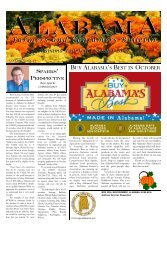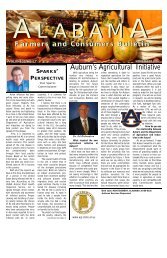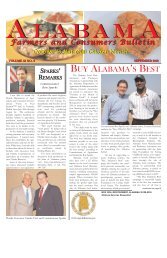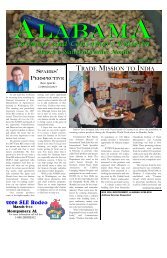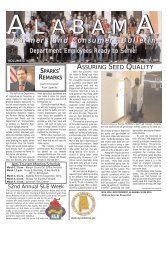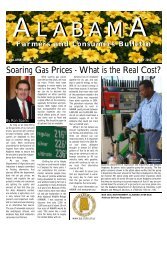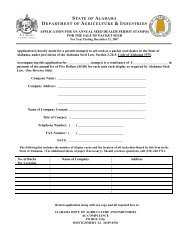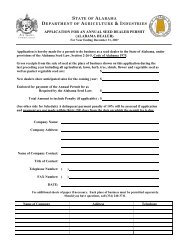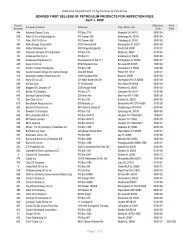Lessons Learned from Rural Schools - Alabama Department of ...
Lessons Learned from Rural Schools - Alabama Department of ...
Lessons Learned from Rural Schools - Alabama Department of ...
You also want an ePaper? Increase the reach of your titles
YUMPU automatically turns print PDFs into web optimized ePapers that Google loves.
LLS-0010 <strong>Lessons</strong> <strong>Learned</strong>_Pub.qrk: 4/25/09 3:02 PM Page 19<br />
TEACHERS<br />
Motivation<br />
• Competitive; desire to excel<br />
• Fear <strong>of</strong> failure—publicized scores; can provide stress<br />
• Intrinsic—always wanted to be a teacher; see the light<br />
bulb come on; I made a difference<br />
• Self-Efficacy—more knowledgeable, better equipped<br />
• Needs—supported, recognized, appreciated, gives us<br />
what we need.<br />
• Achievement—accomplish task, finish on top, want others<br />
to see our scores<br />
• Autonomy—freedom<br />
• Affiliation—FAMILY, good relationships, connected,<br />
community <strong>of</strong> learners<br />
• Equity—fairness, principal is good to us, I scratch your<br />
back, you scratch mine<br />
• Expectancy—we know what to expect (teachers must desire<br />
it also)<br />
• Satisfaction—I love my job, I am called to be here, I<br />
drive by other schools to come here<br />
Methodology<br />
• Have a proud school, publicize accomplishments, get the<br />
right people.<br />
• Designed pr<strong>of</strong>essional development to produce<br />
self-efficacy.<br />
• “Hire highly motivated (find out what motivates them),<br />
qualified teachers;” “hire teachers that love children;”<br />
“hire teachers that have a vested interest in the school (this<br />
is home).”<br />
• “Collaborate in and across grade levels”(produces trust<br />
and community).<br />
• “Do things the right way;” “do what’s right”(these are<br />
not the same).<br />
• Instructional leaders allow for freedom and creativity and<br />
protect instructional time.<br />
• Be fair and consistent (especially the administrator).<br />
• Inspire and challenge; “praise me and I’ll do anything!”<br />
• Develop collaborative goals; “those that create tend to<br />
support.”<br />
• Lead by example; “ultra pr<strong>of</strong>essional, creates loyalty and<br />
trust.”<br />
• “Structure can help, especially for young teachers.”<br />
• Communicate; that includes listening.<br />
• “Technology is a tool, it is also a great equalizer.”<br />
• “Must believe kids can do it.”<br />
• “Give teachers responsibility; let them make decisions.”<br />
• “Research based programs let teachers know how to<br />
teach.”<br />
<strong>Lessons</strong> <strong>Learned</strong> <strong>from</strong> <strong>Rural</strong> <strong>Schools</strong> – May 2009<br />
PRINCIPALS<br />
Motivation<br />
• Achievement (scores)—“highly competitive,” “I like to<br />
win.”<br />
• Intrinsic—“I’m responsible to the kids,” “The best thing<br />
I can give them is an education,” values, job done right.<br />
Determined to be a decision maker and make it better (vision).<br />
• Satisfaction—Feel good at the end <strong>of</strong> the day. Can sleep<br />
when I go to bed.<br />
• Goal setting—results, proud <strong>of</strong> accomplishments.<br />
• Fear <strong>of</strong> failure—“I am <strong>from</strong> here, we have a high standard.”<br />
• Self—efficacy—“don’t teach you to be a principal,<br />
learned by OJT.”<br />
• Needs—I want to be a problem-solver; support and encouragement<br />
is important; want people to have confidence<br />
in me; doing things right.<br />
Methodology<br />
• Build respect among stakeholders; genuineness is<br />
important.<br />
• Nothing undermines vision more than inconsistent<br />
leader behavior.<br />
• Support teachers, staff<br />
• Hire, develop, and support leaders/teachers<br />
• Set high expectations (Goal setting); “no free passes.”<br />
• Celebrate wins<br />
• Communicate goals, vision<br />
• Give teachers opportunity for input.<br />
• Provide money for subs for pr<strong>of</strong>essional development<br />
• “Happy teacher is a good teacher”<br />
• “Our school”<br />
• <strong>Learned</strong> a lot <strong>from</strong> a mentor<br />
• “Action is in the classroom, not the <strong>of</strong>fice.”<br />
• “Should put a person <strong>from</strong> the community as instructional<br />
leader.”<br />
• Support new teachers, pay mentors.<br />
Leadership<br />
• Allow teachers to use own strategies<br />
• Pick teachers: high test scores, passion, enthusiasm, confidence,<br />
love teaching, and willing to go above the call <strong>of</strong><br />
duty.<br />
• Walk throughs in classroom<br />
• Open, safe, secure school<br />
• Data driven<br />
• Develop community relationships—FAMILY, TEAM<br />
• Let teachers lead (grade level, lead teacher)<br />
19



